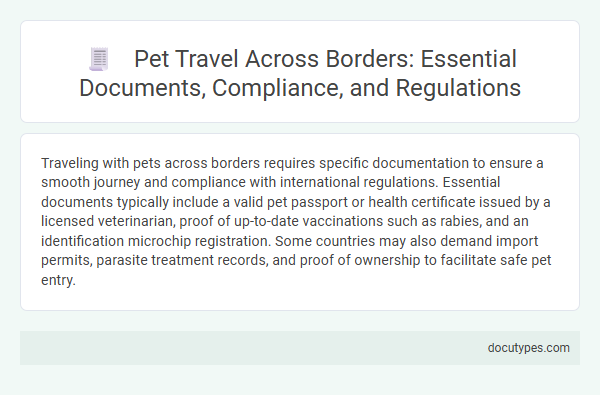Traveling with pets across borders requires specific documentation to ensure a smooth journey and compliance with international regulations. Essential documents typically include a valid pet passport or health certificate issued by a licensed veterinarian, proof of up-to-date vaccinations such as rabies, and an identification microchip registration. Some countries may also demand import permits, parasite treatment records, and proof of ownership to facilitate safe pet entry.
Introduction to Cross-Border Pet Travel
Traveling with pets across international borders requires careful preparation to ensure a smooth journey. Understanding the necessary documents is essential for pet owners planning cross-border trips.
Pet travel regulations vary by country, so having the correct paperwork can prevent delays or refusals at checkpoints. Key documents typically include health certificates, vaccination records, and import permits.
Key Documents Required for International Pet Travel
When traveling internationally with a pet, key documents are essential for a smooth border crossing. A valid pet passport, health certificate issued by a licensed veterinarian, and up-to-date vaccination records, especially for rabies, are critical. Import permits or quarantine certificates may also be required depending on the destination country's regulations.
Understanding Pet Passport Schemes
What documents are needed for pet travel across borders? Understanding pet passport schemes is essential for seamless international pet travel. Pet passports contain vital information such as vaccination records, microchip details, and health certificates required by border authorities.
Health Certificates: Types and Acquisition
| Document Type | Description | Purpose | Acquisition Process |
|---|---|---|---|
| Health Certificate (Veterinary Certificate) | Official document issued by a licensed veterinarian confirming pet health status. | Confirms pet is free from infectious diseases and fit for travel. | Schedule a veterinary exam within the timeframe required by the destination country (often within 10 days before travel). The vet completes and signs the certificate. |
| International Health Certificate (APHIS Form 7001 for USA) | Specialized health document complying with USDA regulations for pet import/export in the United States. | Meets US Department of Agriculture standards; required for pets entering or leaving the USA. | Visit a USDA-accredited veterinarian. The vet fills and signs the APHIS Form 7001; then it must be endorsed by a USDA Veterinary Services official. |
| Rabies Vaccination Certificate | Proof of current rabies vaccination, often required alongside health certificates. | Serves as evidence that the pet is vaccinated against rabies, reducing risk of disease transmission. | Obtain from the veterinarian administering the rabies vaccine. Certificate must be dated and include vaccine details. |
| Tapeworm and Tick Treatment Certificate | Certification of recent treatment against parasites, sometimes mandated by destination countries. | Ensures pet is free of parasites that may pose health risks during travel. | Administer treatment according to guidelines before travel and obtain certification from a vet confirming treatment date and product used. |
Vaccination Requirements and Proof
Traveling with pets across borders requires specific documentation to comply with international regulations. Vaccination requirements, particularly proof of rabies vaccination, are essential and must be up-to-date according to the destination country's guidelines. Pet owners must obtain official vaccination certificates issued by a licensed veterinarian to ensure a smooth border crossing.
Microchipping and Identification Compliance
Traveling internationally with pets requires strict adherence to microchipping and identification regulations. Ensuring compliance with these standards helps avoid delays and guarantees your pet's safe entry across borders.
- Microchip Requirement - Pets must have a microchip implanted that meets ISO 11784/11785 standards for universal readability.
- Matching Identification - The microchip number must correspond exactly to the identification details on the pet's health certificates and passports.
- Pre-Travel Compliance Check - Verify that the microchip is registered with a recognized database accepted by the destination country before departure.
Country-Specific Entry Regulations and Bans
Traveling with pets across international borders requires specific documents to comply with country-specific entry regulations. These documents often include a valid pet passport, up-to-date vaccination certificates, and a recent health certificate issued by a licensed veterinarian.
Certain countries impose strict bans on pets from regions with high disease risk or require quarantine periods upon arrival. Checking the destination country's official government or consulate websites ensures pet owners meet all legal requirements and avoid entry denials or fines.
Quarantine Rules and Exemptions
Traveling with pets across international borders requires careful attention to documentation and quarantine regulations. Understanding these rules helps ensure a smooth entry process and reduces the risk of delays or pet distress.
- Health Certificate - A recent veterinary health certificate proving your pet is free of contagious diseases is mandatory for most countries.
- Rabies Vaccination Certificate - Proof of up-to-date rabies vaccination is often a prerequisite to avoid lengthy quarantine periods.
- Quarantine Rules and Exemptions - Some countries waive quarantine if pets meet specific vaccination and microchipping criteria, while others enforce strict isolation for unfamiliar or unapproved vaccines.
Tips for Smooth Customs Clearance
Traveling with pets across borders requires thorough preparation to ensure smooth customs clearance. Proper documentation and compliance with regulations prevent delays and health risks.
- Valid Pet Passport - This document includes microchip details, vaccination records, and health certificates essential for identification and compliance.
- Health Certificate - Issued by a licensed veterinarian, it confirms the pet's fitness to travel and absence of contagious diseases.
- Import Permits - Some countries require specific permits that must be obtained before arrival to avoid quarantine or fines.
Confirm requirements with both departure and destination authorities well in advance for seamless pet travel experiences.
What Documents Are Needed for Pet Travel Across Borders? Infographic

